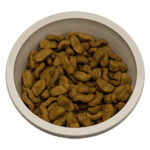Listen to this post |
Royal Canin has developed lines of diets that are unique to the nutritional needs of specific breeds of dogs and cats. Veterinarians and pet enthusiasts alike are well aware that there are aspects of different breeds that make them more predisposed to health challenges, have anatomical breed characteristics that may look nice to human owners but are not functionally or physiologically ideal, or have predilections to certain diseases. The question is, will breed specific diets go the way of the grain free craze that has to date yielded zero proven health benefits (in fact evidence is gathering that grain free is making our pets less healthy), or will they prove to have real efficacy in helping specific breeds of dogs and cats lead healthier, longer lives? It is too early to tell, but the science behind these diets seems sound and the anecdotal data quite promising.
Let’s take, for example, the English Bulldog, a popular breed that carries some of the most severe genetic anatomical and disease predilection challenges in the canine world.

English Bulldogs have short, broad muzzles with narrow sinuses and a narrow upper airway, making it harder to breath. This challenge to breathing becomes even more challenging when they are trying to manage to breathe while eating. To reduce this challenge, Royal Canin formulated a curled, texture kibble that makes it easier for the Bulldog to grab the kibble more efficiently.

English Bulldogs have heavy, compact bodies that stress the joints. They also have notoriously bad skin due to genetic predisposition allergies and deep skin folds that harbor bacteria and yeast. To address both of these issues, the Royal Canin English Bulldog diet is fortified with extra omega-3-fatty acids derived from fish oil that have powerful anti-inflammatory activity in joints and tissues and directly condition and nourish the skin.
English Bulldogs have slower moving digestive systems than other breeds leading to a high degree of fermentation in the hidh gut that leads to one of their most hallmark traits, abundant and especially malodorous flatulence. To address this, the diet is formulated with extra prebiotic fiber to speed digestion and the aforementioned extra omega-3-fatty acids also reduce inflammation of the gut.
This is but one example of many breed specific diets offered by Royal Canin. An important trait of the King Charles Cavalier Spaniel food is fortification with taurine, l-carnitine, and other heart healthy nutrients due to their predisposition to congestive heart failure. In light of their tendency to eat in a rapid and gluttonous fashion, the Labrador Retriever diet provides a kibble shape and texture that encourage more chewing and slows their rate of eating. Persian cats are known for sensitive GI tracts so their diet is carefully formulated with the right balance of fiber and highly digestible proteins.
With veterinary clinical nutritionists on staff and ongoing feeding trials to to monitor clinical responses to their breed specific diets, Royal Canin research and science method behind the diets is impressive. While the ultimate long term benefit of pure breeds being fed breed specific pet diets is not yet fully known, it seems far more likely that these diets will ultimately be found to be far more innovative than gimmicky.
Dr. Roger Welton is a practicing veterinarian and highly regarded media personality through a number of topics and platforms. In addition to being passionate about integrative veterinary medicine for which he is a nationally renowned expert, Dr. Welton was also an accomplished college lacrosse player and remains to this day very involved in the sport. He is president of Maybeck Animal Hospital , runs the successful veterinary/animal health blogs Web-DVM and Dr. Roger’s Holistic Veterinary Care, and fulfills his passion for lacrosse through his lacrosse and sport blog, The Creator’s Game.

